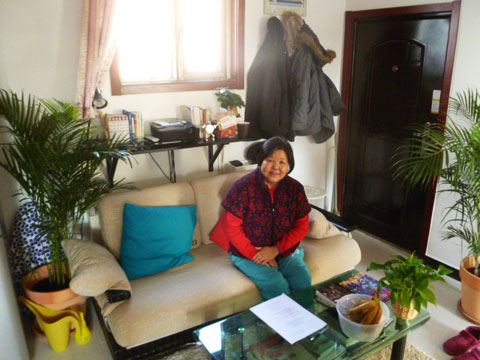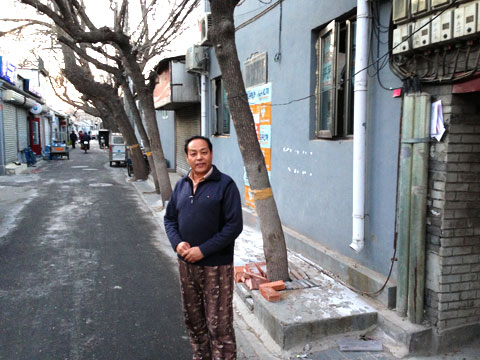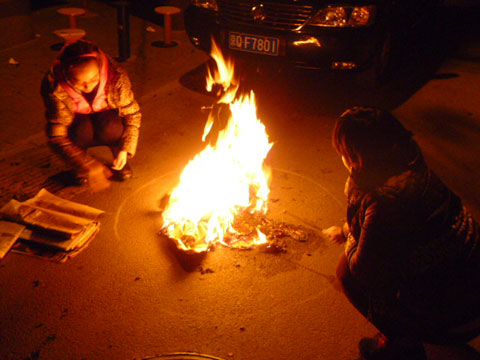Tales from the hutong
Three vignettes from old Beijing in midwinter
In the two months I have lived at no. 19 Xiguan hutong (between the mahjong hall and public toilets, past the sex shop and suspiciously located massage parlour next door), I have come to know the school kid who plays saxophone in the back of a cycle rickshaw, the market man who sells pak choi at a discount when he thinks it’s ugly-looking, and the army of fat cats who mobilise on the low rooftops at dusk.
Hutong life keeps giving. Here are three vignettes from it.
I: The End (of noodles as I know them)
It's the last night before the Mayan end of the world, and my heater is broken. I know I should be contemplating the eternal in those final hours of existence, but it’s minus 10 degrees outside and heating takes priority. I invite my 63 year old Chinese landlady, who insists I call her “auntie”, to look at it. The heater is fixed. Frostbite is averted. Then my landlady notices I am cooking noodles. She squints at me with deep suspicion.“Cook!" she says ominously. "I will watch you."
Terrified, I begin to wash the greens. She points to a piece of dirt I missed. I chop the greens. She tells me I am cutting off the bits with the most nutrients. I skin the tomatoes. She tells me I am being “an idiot” (benzi). She doesn’t explain why. Instead, suddenly, she asks if I have a leek. I do not have a leek. This loses me even more face. She tut tut tuts and goes downstairs to get one. Once she has returned, the noodles are boiling. By a wordless and complicit understanding, I step aside and she cooks them for me.
While I eat them, my landlady tells me about her experiences farming the land during the Cultural Revolution, in a northeastern fringe of Beijing that is now the trendy 798 art district. I discover she is illiterate. Before I can ask more, she sees I have finished the noodles, and nods her approval.
And with that, as suddenly as she arrived, she is gone.

•
II: A Christmas Carol
It is Christmas eve, and I am craving dumplings for breakfast. It snowed the day before, and there are signs on the walls of my hutong warning us to cycle carefully. As I walk down from my flat into the shared courtyard, I meet my neighbour, Uncle Shi, a smiling man of an unguessable age between fifty and seventy. He is in his pajamas, taking out the trash. We shoot the breeze, despite its chill.
I ask Uncle a question I have been harbouring since I moved in. Who in our complex has been singing such beautiful Chinese opera which I have been hearing faintly through my walls, in between all the construction drilling? Uncle looks at me obliquely. I wonder if I have committed a faux pas. The silence draws out uncomfortably. Then he flashes me his teeth – and breaks into song.
For lo, it is he! First he sings a Peking opera refrain, in a rich baritone you would expect from an Italian in a tux not an aging Chinese man in his pjs. Next, “I love you, you love me,” which Sarah Brightman sang at the closing ceremony of the Beijing Olympics. And finally, just for me, Silent Night in butchered English. (“Alll is carrrm! alll is blight!”)
The performace ends. Uncle and I go our separate ways.

•
III: In Bleak Midwinter
A midwinter night. I am walking home, and make the first turning into the labyrinth of narrow alleyways that conceals my flat. Ahead, there is a small bonfire on the street, with two young women on either side. Coming closer, I see they have drawn a circle around the fire in chalk – how I admire China’s health and safety standards – and are feeding it with cardboard and old newspapers.
I feel, somehow, that to ask them what they are doing would be an intrusion. I walk on, turn the corner – and there is another fire, this time stoked by a middle aged couple. I pass by it, and two charred, dead fires, and one which an old man is trying to get going, striking matches into the wind. I begin to think of them as cat’s eyes guiding me home.
At the final flame before my house, tended by a young chubby guy, I stop and ask him what’s with all the fires. He says it’s a Chinese custom, on this day, to light them. “For the departed loved ones.” His is for his father, who passed away when he was small.
I walk the last twenty yards home, and switch on all the lights.

Who knows what other secrets my hutong holds?
Happy new year all.

















